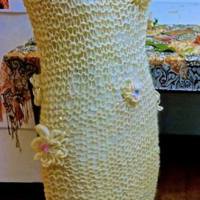Humanitarian Assistance – The New Colonialism?
Is there a fine line between assisting marginalized groups on the one hand, and modern versions of Colonialism on the other? This issue came out (yet again) quite clearly last week, with regard to my own work – as well as that of a group that came from the States to Burundi to see the results of the assistance that they have been giving to a Batwa pygmy community in the country.
The Batwa of central Africa are considered the indigenous (oldest) inhabitants of the region and are the most socially and economically marginalized of groups, having very little education and equally little political or economic power.

Batwa men in the early 19th.C., photographed by Oscar Baumann
Traditionally they have specialized in pottery and metal working that is sold in rural markets – this is still the case, but plastics and other cheap imports are undermining their meager economic niche.

Hand-operated bellows are still used today, being tried out here by our driver. The man on the left is fashioning a hand knife.
Leading a semi-nomadic lifestyle, Batwa habitations continue to be of straw. However, over the last few years, the government has been working to ‘settle’ the groups on lands that the government provides (such as shown here):

A Batwa home with pottery production in the front yard. Women make the pots and men collect the clay
Governments of the area are attempting to establish permanent settlements, often in some of the most barren regions of the country. Assistance in building mud brick homes may be given by various groups, including the NGO with which I collaborate.

A newly built home of mud brick, with the old straw home retained alongside.
Over the past several years I have been working with a local NGO (Non-governmental organization) to assist a Batwa community in their area with their pottery production by way of sales to Bujumbura to a major tourist hotel, and with the profits going back to the community to help with education and other needs. Marketing their pots is one of the biggest problems and so we have been trying to establish reliable marketing channels to Bujumbura and also help with upgrading in clay production.
Every few months I go to the settlement to organize another batch of pots and also to help sort out some of their production and other problems.

As soon as we arrive, everyone hurries over with their pots.

Families arrange their pots for inspection

Pots are inspected and prices negotiated.

Everyone then helps load the pots onto the pickup.

The pots are wrapped in leaves and carefully stacked.

Then it is time for lunch
For some of the children, we have been able to help keep them in school – considered the most valuable investment on the part of the families and the community, to help secure their future both economically as well as socially and politically.

Batwa girls in a local school
So far, so good.
But then, for me, the wrinkle begins: Another Batwa group – who live in equally impoverished conditions, were put up in the best tourist hotel in the country for 4 days where they were to ‘get to know’ the Americans who had been supporting their community development program. In order to accomplish this leap from straw huts to luxury accommodations, the group was first kept in a guest house for a few days, where they were taught about running water, electric lights, proper eating with cutlery, and the men – how to wear a necktie – and so forth.
Then, to the luxury hotel, where they were feted with more food and kindness than most will likely ever experience again.

Fish

Salad

Hot dishes
And, in return, the Americans were feted with traditional dancing and drumming.

Traditional drumming

Young men's traditional dance

Young women's traditional dance

Men's traditional war dance

Donors' dance with Batwa

Dancing warriors sit this one out...
Why the rub? In comparing the two approaches – modest inputs of the kinds with which I have been involved, and a kind of shock immersion of cultural encounters – Batwa and American – I wonder. Should I have been working to put up Batwa in the hotel, to experience 21st. Century tourism-Americanism? Well, no – after all, this event was to embed Americans into local Batwa culture as much as vice-versa. I think.
I just can’t help but feel uncomfortable about the whole event, and in large part because it has thrown my own modest efforts into a bit of doubt.
Where does the humanitarian assistance ‘end’, and neocolonialism ‘begin’? Or should the question be reframed? More thoughts in later blogs…
Related articles
- Batwa Pots in Burundi: Traditional Clay Pot Cuisine, Pt. 2 of 2 (dianabuja.wordpress.com)
- Batwa Pots in Burundi: Traditional Clay Pot Cuisine, Pt. 1 of 2 (dianabuja.wordpress.com)
- Diverse microbes in Pygmy saliva (dienekes.blogspot.com)



























Pingback: Huts & Votive Offerings in 19th Century Africa « Dianabuja's Blog
Rachel – Welcome to my blog and glad that you find it interesting. For me, it is a continual issue, that of making ‘Them’ like ‘Us’. It is, in my experience, an unavoidable aspect of what we call the development paradigm. And I have many issues with it, which I’ll get into with my blog.
Diana.
LikeLike
“…white man pampering black man to keep him in his place.” Pampering? Hmmm. I guess I (and my entire family) must have missed all of that pampering in all my years in black skin. But I’d certainly be interested to hear the take on “pampering” that prompted that comment.
Diana, I read your blog entries posted on FB as we share friends and I find it so interesting.
This entry I find intriguing in the way that you contrast the two experiences. I wonder the same thing myself quite often. I was an administrator at an elite independent school in Seattle before turning my attentions to food writing. I ran the service learning (volunteer) program and so many wealthy students took jaunts to Kenya (that was the favorite spot back then) to help out the Masai, building them homes and what not. Several times those members of the Masai (and other groups) were brought to the school and feted in the way you describe and there was no thought given to this at all. All of the legacy families would come and/or host the honored guests in their gated communities, etc. and then would come the inevitable school assembly where everyone got to pat themselves on the back in front of smiling, dancing Masai who were sent home afterwards. I have to stop now because it irks me so. I’ll only say this: I didn’t attend any of those school assemblies.
LikeLike
you’ve certainly touched a raw nerve – another case of white man pampering black man to keep him in his place
LikeLike
Maria – thanks for your comment, which can be the case in many instances. As well, there are many persons and groups that are simply not aware of the dynamic they have set up – the results can be interpreted as you suggest but those involve may claim otherwise. It is indeed a raw nerve, as you say!
LikeLike